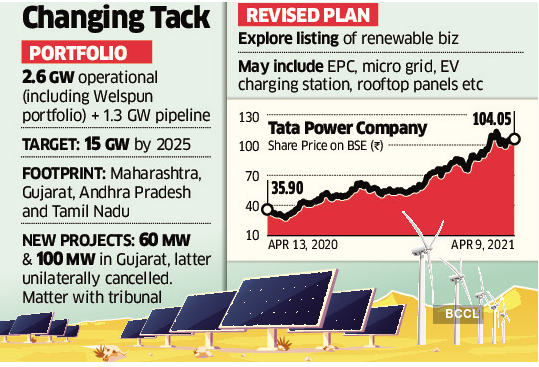After year-long negotiations, the Tatas have terminated their near $2- billion investment deal with Malaysian state-owned oil and gas company Petroliam Nasional Bhd (Petronas) in Tata Power’s proposed renewable energy infrastructure investment trust (InvIT), said multiple people aware of the development.
The decision to pull out at this advanced stage was conveyed last week after both sides were in the final stages of negotiating a binding term sheet.
The Indian conglomerate has gone back to the drawing board to explore an IPO for the business to capitalise on the frenzied interest of investors for green energy companies around the world, across public and private markets. As part of the listing plans, Tata Power is likely to create an umbrella entity that will house its operational and pipeline IPP projects along with its microgrid, rooftop solar panels and EV charging stations operations.
Tata Group spokesperson declined to comment. Petronas did not respond till press time Sunday.
Last year, Tata Power Renewable Energy Ltd (TPREL) a wholly-owned subsidiary of Tata Power Co. Ltd (TPCL), India’s largest integrated utility company, had initiated a strategic move to raise $500-750 million for its clean energy platform to unlock value and pare TPCL’s net debt from Rs. Rs 36,363 crore (December 2020) to around Rs. 25,000 crore. ET had reported in its June 5 edition last year that Petronas was in discussions with Tatas to come on board as a large anchor investor in the clean energy InviT. Citi and ICICI Securities were advisors in the deal.
The protracted talks finally resulted in a broad understanding between two sides towards the end of the year for a multi-year, phased investment plan, added the people mentioned above on condition of anonymity. Petronas had agreed to invest Rs 3500-Rs 3800 crore ( $466-500 million) upfront for a near 30-35% stake in the InvIT at an $2.5 billion enterprise value. This trust would only house 2.6 GW of operational and developed wind and solar parks but would have the option to bulk up in future. An additional $1.5 billion investment was also committed by the energy giant for a pipeline of projects over a specified timeline of 3-5 years.

LEANER & GREENER
The sudden U-turn has surprised many group watchers. The Tata Power stock had appreciated 285% (almost 3x) in the last 1 year in anticipation of this transaction. Following Petronas, a clutch of other institutional and financial investors were also to come on board as part of a consortium in future.
Even during Q3 FY 21 results, Praveer Sinha, CEO and MD of Tata Power had said he was confident of monetising the assets through the InvIT. “This will give us the necessary capital for investing in growth and to also reduce our debt substantially,” he had this February. The board had also blessed the InvIT plans last year following which SEBI approvals were sought.
“Both sides were focussed on finalising the binding agreement,” said a person involved on condition of anonymity. “It was at that point it was relayed that the board was hesitant to proceed any further since it felt better valuations can be achieved through an IPO. The surge in the Adani Green stock, ReNew Power SPAC listing has really made everyone excited to tap the capital markets.”
However, no timeline for the listing or valuation has yet been done.
The InviT was the first step toward a mega transformation in TPCL that so far has been largely hemmed in due to a bloated balance sheet. “Divestment-related measures and infusion from the promoter has aided debt reduction. Possible benefits from favourable InvIT valuations provide scope for further upside,” said Aniket Mittal, analyst with Motilal Oswal.
The management has been highlighting plans to deleverage more than $1bn in net debt. “The biggest delta is likely to come with the advent of Renewable InvIT – which would knock off $1.8bn debt from the balance sheet,” argued Swarnim Maheshwari, analyst with Edelweiss. “While Street’s fixated on legacy troubles and valuing TPCL accordingly, we argue the company has outlived its past and is primed for sustainable and clean growth. We plumb TPCL’s new opportunities ($87bn) —renewable energy (RE), distribution and EV — and its positioning thereof.
However, analysts believe Adani Green has a far bigger and ambitious footprint planned compared to Tatas. Tata Power Renewables has a 4.07 GW capacity of which 2.6 GW are operational and another 1.3GW under implementation. It’s largely a solar portfolio, on account of its controversial $1.4 billion acquisition of Welspun Energy’s assets in June 2016. The clean energy portfolio is 30% of Tata Power’s total power generation capacity. Tatas have been targeting 15 GWs from clean power sources by 2025. In comparison, Adani Green and its French partner Total is seeking to commission 25 GW in that same period.
